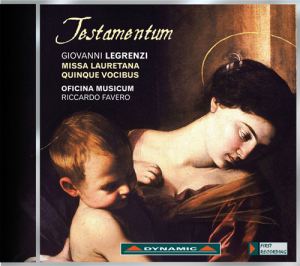 |
 |
|


alternatively
CD:
MDT
AmazonUK
AmazonUS
Sound Samples & Downloads
|
Giovanni LEGRENZI (1626-1690)
Testamentum: Sonata La Spilimberga Op. 2, no 2 [6:38];
Sonata'La querini' Op. 2, no 14 [4:22]; Missa quinque
vocibus 'Lauretana' [33:35] Congratulamini Filiae Sion
[5:45]; Harmonia d'affetti devoti, 'Hodie collaetantur coeli'
Op. 3, no 1; written by 1655 [5:15]Compiete con le lettanie,
'Alma Redemptoris Mater' Op. 7, no 14; written by 1662 [3:07]
 Lia Serafini (soprano); Roberta Giua (soprano); Oficina
Musicum/Riccardo Favero
Lia Serafini (soprano); Roberta Giua (soprano); Oficina
Musicum/Riccardo Favero
rec. September 2009 - 2012, Chiesa di Sant'Alessandro Martire,
Massanzago, Italy. DDD
 DYNAMIC CDS 710 [58:42]
DYNAMIC CDS 710 [58:42]
|
|
|
This is music of great beauty, sophistication and emotional
strength. It's performed with aplomb, sensitivity and technical
zest by Oficina Musicum and soprano soloists conducted by Riccardo
Favero. It's a major release of works which - apart from the
Spilimberga sonata on Ligia 301109 - are otherwise unavailable.
The quality of performance is by and large excellent. You are
herewith invited to join the Legrenzi 'revival' to which this
CD contributes so successfully.
Legrenzi was a major influence on music and musicians of his
own time and that and those immediately succeeding him in late
seventeenth century Italy and beyond. Among his pupils were
Vivaldi and possibly Caldara. He was a major influence on Alessandro
Scarlatti. His sonatas became the standard format for what followed
- both as the trio sonata and sonata a due. He developed
the practice of purposeful and clear distinctions in tempo markings
between movements. Yet Legrenzi is not exactly over-represented
in the current catalogue. Astonishingly the present CD is but
one of half a dozen devoted exclusively to the North Italian
composer. It should be snapped up by anyone who already knows
Legrenzi's allure, wants to explore the development of chamber,
concertante and virtuosic music of the era and who appreciates
the unalloyed beauty of whatever form in which Legrenzi wrote.
It's a fetching programme too: the Spilimberga sonata
is unpretentious yet arresting. It says much in a few minutes
but its distillation is not jarring. The bulk of the less than
an hour long CD is given over to the exquisite and gently but
persuasively played and sung Lauretana five voice mass.
This work unfolds slowly and with a subtle inevitability and
clarity that is admirably conveyed by soloists and instrumentalists
(in the interspersed numbers) alike. A little disappointingly,
the soloists are at times either under-miked and/or placed too
far from our virtual listening point to sound as present and
immediate as we might prefer. The allelujia [tr.8], for
instance, is a solo tour de force that would have benefited
from greater exposure so sure and clean are the singer's vocal
lines and artless articulation.
The delightful querini sonata breaks the flow of purely
vocal/choral music. This presumably is deliberate in order to
provide a contrast that also speaks to Legrenzi's versatility
and inner strengths as a composer. These reflect as much what
he seems to have wanted to achieve as a musician as was required
of him by his patrons. The obviously committed Oficina Musicum
stays on top form. They and sopranos Lia Serafini - whose timbre
is at time a little less than refined and less crystalline than
might be expected - and Roberta Giua lead the last three shorter
(but far from insubstantial) vocal Marian pieces, Congratulamini
Filiae Sion, Harmonia d'affetti devoti, 'Hodie collaetantur
coeli' and Compiete con le lettanie, 'Alma Redemptoris
Mater'.
Although the word 'gem' comes to mind when enjoying these pieces,
they're performed in a clean and unostentatious way. It is as
though Legrenzi were already now as re-established and oft-performed
a composer as those of his contemporaries and successors with
higher profiles. This is surely the right approach and Favero
and Dynamic are to be congratulated on it.
The recording and acoustic are good but not perfect. Ultimately,
the beauty of the music and the strengths of the performance
overcome these reservations. The booklet that comes with the
CD is adequate. It concentrates on the provenance and nature
of the manuscripts of the mass that have been used. It contains
the texts in Latin.
Legrenzi is yet another composer in the 'early' music world
who deserves the appellation 'forgotten'. Here Favero has unfussily
and without self-consciousness argued the composer's case well
- by letting he music unfold on its own terms. He quietly and
confidently helps to ensure that Legrenzi will stay 'overlooked'
not a moment longer than he can help. He does so with style
and a depth that are only to be admired. Although the profundity
and loveliness of Legrenzi's music will surprise you if you're
not fully familiar with it, this CD makes a quiet and sane contribution
to his profile. Don't hesitate.
Mark Sealey
|
|












